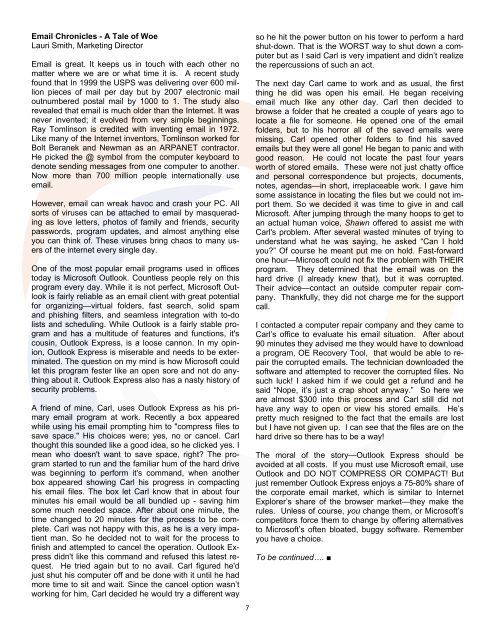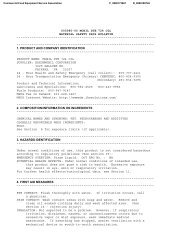On Target
mar april 2008.pub - CFESA
mar april 2008.pub - CFESA
- No tags were found...
Create successful ePaper yourself
Turn your PDF publications into a flip-book with our unique Google optimized e-Paper software.
Email Chronicles - A Tale of Woe<br />
Lauri Smith, Marketing Director<br />
Email is great. It keeps us in touch with each other no<br />
matter where we are or what time it is. A recent study<br />
found that In 1999 the USPS was delivering over 600 million<br />
pieces of mail per day but by 2007 electronic mail<br />
outnumbered postal mail by 1000 to 1. The study also<br />
revealed that email is much older than the Internet. It was<br />
never invented; it evolved from very simple beginnings.<br />
Ray Tomlinson is credited with inventing email in 1972.<br />
Like many of the Internet inventors, Tomlinson worked for<br />
Bolt Beranek and Newman as an ARPANET contractor.<br />
He picked the @ symbol from the computer keyboard to<br />
denote sending messages from one computer to another.<br />
Now more than 700 million people internationally use<br />
email.<br />
However, email can wreak havoc and crash your PC. All<br />
sorts of viruses can be attached to email by masquerading<br />
as love letters, photos of family and friends, security<br />
passwords, program updates, and almost anything else<br />
you can think of. These viruses bring chaos to many users<br />
of the internet every single day.<br />
<strong>On</strong>e of the most popular email programs used in offices<br />
today is Microsoft Outlook. Countless people rely on this<br />
program every day. While it is not perfect, Microsoft Outlook<br />
is fairly reliable as an email client with great potential<br />
for organizing—virtual folders, fast search, solid spam<br />
and phishing filters, and seamless integration with to-do<br />
lists and scheduling. While Outlook is a fairly stable program<br />
and has a multitude of features and functions, it's<br />
cousin, Outlook Express, is a loose cannon. In my opinion,<br />
Outlook Express is miserable and needs to be exterminated.<br />
The question on my mind is how Microsoft could<br />
let this program fester like an open sore and not do anything<br />
about it. Outlook Express also has a nasty history of<br />
security problems.<br />
A friend of mine, Carl, uses Outlook Express as his primary<br />
email program at work. Recently a box appeared<br />
while using his email prompting him to "compress files to<br />
save space." His choices were; yes, no or cancel. Carl<br />
thought this sounded like a good idea, so he clicked yes. I<br />
mean who doesn't want to save space, right? The program<br />
started to run and the familiar hum of the hard drive<br />
was beginning to perform it's command, when another<br />
box appeared showing Carl his progress in compacting<br />
his email files. The box let Carl know that in about four<br />
minutes his email would be all bundled up - saving him<br />
some much needed space. After about one minute, the<br />
time changed to 20 minutes for the process to be complete.<br />
Carl was not happy with this, as he is a very impatient<br />
man. So he decided not to wait for the process to<br />
finish and attempted to cancel the operation. Outlook Express<br />
didn't like this command and refused this latest request.<br />
He tried again but to no avail. Carl figured he'd<br />
just shut his computer off and be done with it until he had<br />
more time to sit and wait. Since the cancel option wasn’t<br />
working for him, Carl decided he would try a different way<br />
7<br />
so he hit the power button on his tower to perform a hard<br />
shut-down. That is the WORST way to shut down a computer<br />
but as I said Carl is very impatient and didn’t realize<br />
the repercussions of such an act.<br />
The next day Carl came to work and as usual, the first<br />
thing he did was open his email. He began receiving<br />
email much like any other day. Carl then decided to<br />
browse a folder that he created a couple of years ago to<br />
locate a file for someone. He opened one of the email<br />
folders, but to his horror all of the saved emails were<br />
missing. Carl opened other folders to find his saved<br />
emails but they were all gone! He began to panic and with<br />
good reason. He could not locate the past four years<br />
worth of stored emails. These were not just chatty office<br />
and personal correspondence but projects, documents,<br />
notes, agendas—in short, irreplaceable work. I gave him<br />
some assistance in locating the files but we could not import<br />
them. So we decided it was time to give in and call<br />
Microsoft. After jumping through the many hoops to get to<br />
an actual human voice, Shawn offered to assist me with<br />
Carl's problem. After several wasted minutes of trying to<br />
understand what he was saying, he asked “Can I hold<br />
you?” Of course he meant put me on hold. Fast-forward<br />
one hour—Microsoft could not fix the problem with THEIR<br />
program. They determined that the email was on the<br />
hard drive (I already knew that), but it was corrupted.<br />
Their advice—contact an outside computer repair company.<br />
Thankfully, they did not charge me for the support<br />
call.<br />
I contacted a computer repair company and they came to<br />
Carl’s office to evaluate his email situation. After about<br />
90 minutes they advised me they would have to download<br />
a program, OE Recovery Tool, that would be able to repair<br />
the corrupted emails. The technician downloaded the<br />
software and attempted to recover the corrupted files. No<br />
such luck! I asked him if we could get a refund and he<br />
said “Nope, it’s just a crap shoot anyway.” So here we<br />
are almost $300 into this process and Carl still did not<br />
have any way to open or view his stored emails. He’s<br />
pretty much resigned to the fact that the emails are lost<br />
but I have not given up. I can see that the files are on the<br />
hard drive so there has to be a way!<br />
The moral of the story—Outlook Express should be<br />
avoided at all costs. If you must use Microsoft email, use<br />
Outlook and DO NOT COMPRESS OR COMPACT! But<br />
just remember Outlook Express enjoys a 75-80% share of<br />
the corporate email market, which is similar to Internet<br />
Explorer’s share of the browser market—they make the<br />
rules. Unless of course, you change them, or Microsoft’s<br />
competitors force them to change by offering alternatives<br />
to Microsoft’s often bloated, buggy software. Remember<br />
you have a choice.<br />
To be continued…. ■








